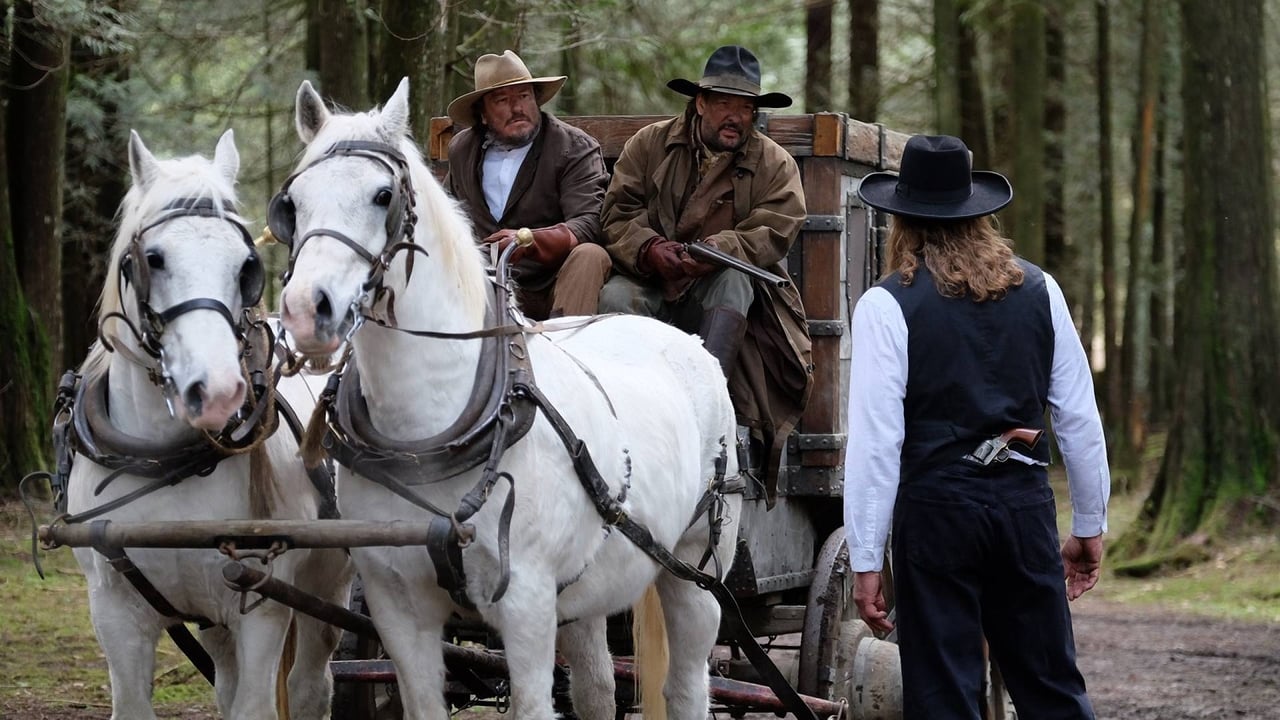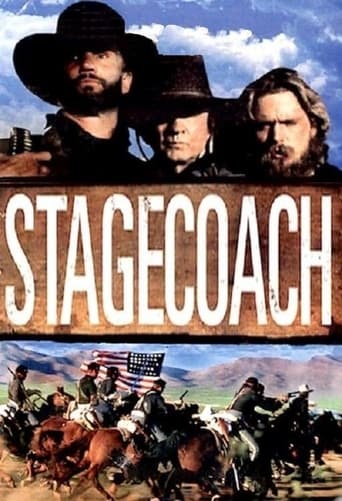

The original 'Stagecoach' from 1939 is to me a timeless classic and one of the finest westerns ever made. The 1966 film was a fair one, very much inferior and uneven and one questions the point of it but at the same time it had several big pluses to make it watchable.Admittedly, when hearing of this 1986 film expectations were very low. As talented as these country and western stars are, the whole concept just screamed of one big gimmick that could easily have gone disastrously wrong. That it had a limited budget too further added to the intrepidation, which had potential to severely diminish the western atmosphere, which ideally should have excitement and tension which was likely not to happen with low-budget.Seeing it, and judging it on its own merits, 'Stagecoach' (1986) turned out to be not as bad as expected with some serviceable things. As feared though, it is even more uneven than the 1966 version, has more (and bigger) flaws, it is a little gimmicky somewhat and even on its own merits many people (myself included) are likely to question the point of it or find any reason for it to be made in the first place.Certainly, there are some good things. Things do pick up in the second half, where the pace is given a sharper kick and more happens while the build up to the climax and the climax itself are exciting and suspenseful. The soundtrack is infectious and a lot of fun, while the costumes suit the western genre well. Some of the performances are good. Anthony Newley clearly is enjoying himself in his brief appearance, while Tony Franciosa does his nervous act well, John Schneider is handsome and charismatic enough, Mary Crosby allures and Kris Kristofferson while not as charismatic as John Wayne has far more presence and likability (also appropriately stoic) than the wooden and vacuous Alex Cord.However, Johnny Cash is somewhat stiff while both Willie Nelson and Waylon Jennings look uncomfortable, Jennings actually looks as though he didn't want to be there and Nelson clearly had no idea how to portray the character. Elizabeth Ashley looks pained throughout too, exposing a limited acting ability, lack of experience and lack of connection with her character (which is admittedly not an interesting one in the first place).Furthering hindering the film are in particular a long-winded and drawn-out script that veers on the preachy at times. The direction is pedestrian, aimless even in the first half and failing to inject any urgency until late into the film. The story lacks the fun and tension of especially the 1939 film, and lacks the necessary grit too making everything feel bland. It also really struggles to come to life in the first half, although improving in the climax and its build up. The limitations in budget hurt 'Stagecoach' (1986) also, with a choppy and drab look that was crying out for more majestic sweep and the production design looking like it was constructed in haste. This is sad because the scenery is actually quite nice.On the whole, definitely could have been much worse but just didn't see the point. Interesting to see so many country and western stars together, who are very talented at what they do in their own way, but some fare significantly better than others while others flounder. 4/10 Bethany Cox
... View MoreIf you haven't seen the 1939 original directed by John Ford to make the comparison, this film doesn't stack up too badly. It pretty much follows the script of the earlier movie, with characters who remain mostly the same with a couple of minor variations. Willie Nelson's Doc Holliday is the notable exception, appearing here with fellow country music legends Waylon Jennings, Johnny Cash and Kris Kristofferson. Seeing as how as an actor, Kristofferson is no John Wayne, it wasn't surprising that his entrance as The Ringo Kid didn't have the same high drama as that of Wayne's Ringo. The stakes weren't as high either, "Stagecoach" was the film that launched Wayne's career after only about fifty other films prior that he appeared in.The picture could probably have used a bit more humor to liven things up a bit. One of the things that impressed me about the original "Stagecoach" was how most of the characters started out as caricatures and wound up being people you either cared about, or so repulsive that you wanted to see them get what was coming to them. I didn't get the same sense of that here, as most likely, the celebrity status of the principals kept intruding on their portrayals. I thought Willie Nelson did the best job in his role as Doc Holliday, by contrast I felt Johnny Cash was rather bland as Marshal Curly Wilcox. Waylon Jennings was OK as gambler Hatfield, while Kristofferson's take on the Ringo Kid seemed watered down by his relationship with reformed hooker Dallas (Elizabeth Ashley). It didn't help that the chemistry between them seemed non-existent, except for Ashley's swooning eyes whenever she gazed on The Kid.So if I'm forced to make the call, I'd say see the original "Stagecoach" at some point, but if you're a fan of any of the principals, I don't think you'll come away disappointed. You might even learn a thing or two from the likes of Doc Holliday, like washing your hands with whiskey before delivering a baby. It's supposed to kill germs, right?
... View MoreIn "Stagecoach" the late Mr T.Post treads a difficult line between the original Ernest Haycox story "Stage to Lordsburg" with it's frontier values and the rather more liberal views of a mid 1980s audience to some of whom Geronimo might appear to be a freedom fighter rather than a brutish savage. His voice is articulated by Mr W.Nelson,one of the most significant Country artists of the 20th century who appears slightly uncomfortable as "Doc" Holliday,a man plucked from history to be the conscience of the movie. Having appeased contemporary sensibilities,Mr Post goes pretty much down the traditional Western road with a brave if not very bright lawman (Mr J.Cash),a bar girl (Miss E.Ashley),a gambler(Mr W.Jennings) and that most revered of American figures a pregnant lady(Miss M.Crosby) amongst others travelling on a stagecoach through Apache territory. It's a pleasing enough picture that lovers of TV Westerns should enjoy. There are some funny lines,many of which are deftly handled by Mr A.Newley as an itinerant whisky salesman,a role in which he was allowed to retain his English accent.Half - hearing a conversation about Geronimo,he says.."Excuse me..who exactly is this ..Geraldo.. fellow?" a line which,if spoken in American would have been meaningless but as he says it immediately brings to mind that most determinedly English of English bandleaders. Unfortunately,Mr Newley is whisked away in such haste as to almost appear rude,and the picture is rather diminished by his going. Nonetheless the second half is enlivened by the appearance of Mr K.Kristofferson as the Ringo Kid and he is twinkly but determined to get his vengeance on those who murdered his brothers. This is all good TV Movie stuff and my generation can sigh at the appearance of Mr L.Larue whose adventures at the Saturday Morning Pictures set many an 8 year - old heart a - flutter. You don't have to love Country Music to enjoy "Stagecoach" but it sure doesn't harm in any either.
... View MoreWhere to start? Well, it's a good movie. Very good. And not a 100% shot by shot remake of the 1939 John Ford story. Events closely mirror the 1939 film, but are changed up, almost entirely for the better, so even if you've seen the 1939 film, it's like you're watching a different movie because you're never quite sure what will be included and what will change from the original. In general, the changes are almost all more naturalistic. Without giving spoilers, I will say that Mr. Peacock gets a chance to leave the stagecoach at the first stop, preventing the story from having to carry on the dead weight of an unwilling passenger who has no reason to take the dangerous trip, Buck is changed from the cowardly moron he was in the 1939 film to more of an every-man, and Curley Wilcox is a more compassionate, sensible man, instead of the guy dragging everyone along like he seemed in the 1939 film. The 1939 film was good in its own right, and a classic, but that's no reason to skip over the fact that it had plot holes. My hat goes off to the writers of this movie, who changed it so it's the same basic story, but people act more logically and events happen more naturally. Plus, the dialogue was good. Willie Nelson and Johnny Cash stole the spotlight as the only really recognizable actors (well, musician-actors), but the other, less recognizable actors in the movie held up quite well. And, particularly in the middle of the movie, there were several conversations with laugh-out-loud funny parts in them (at least I thought so!).Now, for why I'd rate it a 9 out of 10 instead of 10. First, I thought changing Doc in the original to Doc Holiday, on his way to Tombstone, was kind of contrived and gimmicky. Second, the movie was a bit lower budget by comparison to the 1939 film, and it had less cinematography and less music (it seemed like there was only one tune in the movie, the one made by Willie Nelson), but that was only a minor disappointment. And third, the conversations between Dallas and Ringo were only so-so, and I felt like Curley and Buck had a more meaningful relationship than they did.But those are just minor quibbles. If you haven't seen John Ford's 1939 movie Stagecoach, you won't be lost watching this movie. And if you have seen his 1939 film, this film is an improvement and a new story, which will keep you guessing what will happen next from beginning to end. Either way, this movie is well worth your money if you see it as a triple-feature DVD in the Wal-Mart Bargain Bin like I did.
... View More